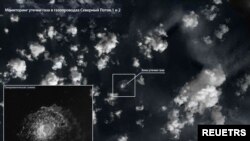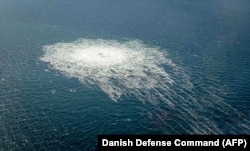Sweden’s domestic security agency said Thursday that its initial investigation into explosions last week along two Russian natural gas pipelines in the Baltic Sea "has strengthened the suspicions of serious sabotage" as the cause.
Separately, a Swedish prosecutor said that "seizures have been made at the crime scene and these will now be investigated," although he did not identify the seized evidence.
Neither of the underwater Russia-to-Germany Nord Stream 1 and Nord Stream 2 pipelines had been in use at the time of the blasts but for days sent methane from the pipes bubbling to the surface off the coasts of Sweden and Denmark.
Some Scandinavian officials have speculated that Russia detonated the pipeline explosions as a way to punish Western allies for their support of Ukrainian forces in fighting Moscow’s seven-month invasion and to cut the possible flow of fuel for the coming winter months.
But Russian President Vladimir Putin has accused the West of attacking the pipelines, which the United States and its allies have vehemently denied. They have said that Russia had the most to gain by disrupting Europe's energy supplies.
The Swedish Security Service said its investigation confirmed that "detonations" caused extensive damage to the pipelines. The security agency said what happened in the Baltic Sea was "very serious," but did not release further details of its investigation.
Prosecutor Mats Ljungqvist said he had given "directives to temporarily block [the area around the damaged pipelines to] carry out a crime scene investigation."
But he said that now that the initial probe is completed, the blockade around the pipelines off Sweden will be lifted.
The Danish and Swedish governments had previously said they suspected that several hundred pounds of explosives were used to damage the pipelines.
Some of the material in this report came from The Associated Press and Reuters.







